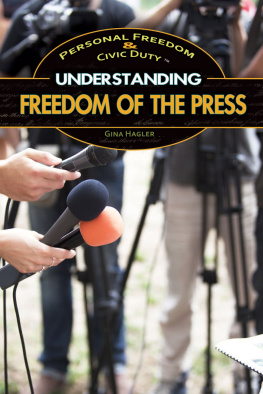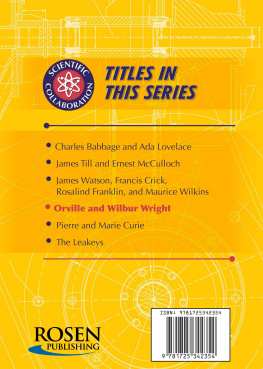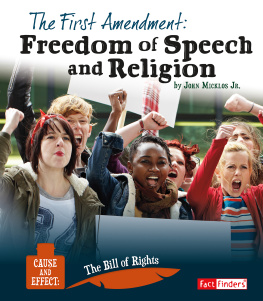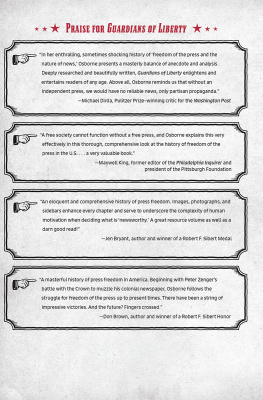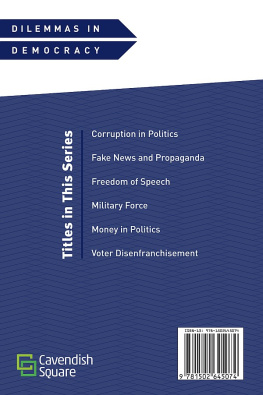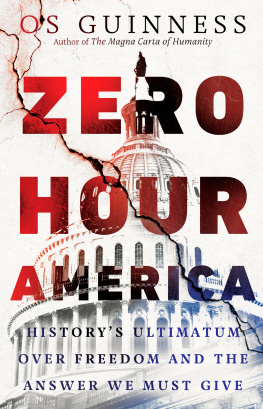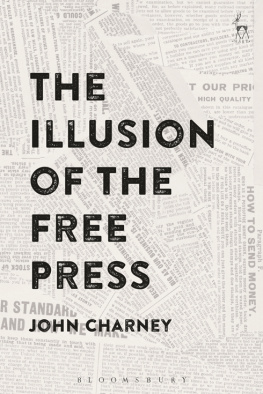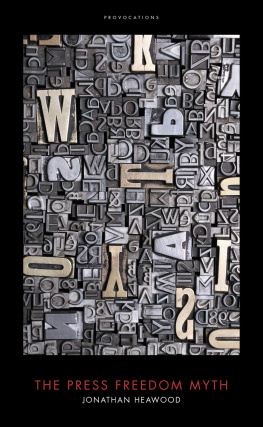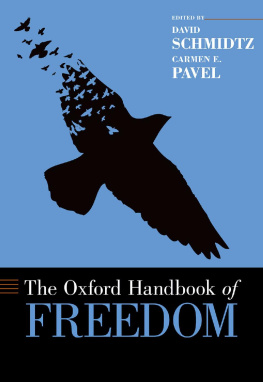Published in 2014 by The Rosen Publishing Group, Inc.
29 East 21st Street, New York, NY 10010
Copyright 2014 by The Rosen Publishing Group, Inc.
First Edition
All rights reserved. No part of this book may be reproduced in any form without permission in writing from the publisher, except by a reviewer.
Library of Congress Cataloging-in-Publication Data Hagler, Gina.
Understanding freedom of the press/Gina Hagler.First edition.
pages cm.(Personal freedom & civic duty)
Includes bibliographical references and index.
ISBN 978-1-4488-9465-9 (library binding)
1. Freedom of the pressUnited StatesJuvenile literature. I. Title.
KF4774.H33 2014 342.7308'53dc23
2012043295
Manufactured in the United States of America
CPSIA Compliance Information: Batch #S13YA: For further information, contact Rosen Publishing, New York, New York, at 1-800-237-9932.
C hapter
C hapter
C hapter
C hapter
C hapter
T he First Amendment of the Constitution guarantees freedom of the press. In fact, it specifically states, Congress shall make no law respecting an establishment of religion, or prohibiting the free exercise thereof; or abridging the freedom of speech, or the press; or the right to petition the government for a redress of grievances. Sounds simple, but take a closer look: the amendment doesnt spell out exactly what the Founding Fathers intended. The language is broad, and it leaves quite a bit of room for disagreement.
Today people can learn breaking news from sources that range from the Internet to cable news channels.
The idea of a free press was born from the colonists experiences with British rule. They wanted to be sure their new country would have a press that could report on whatever it wanted, whenever it wanted. They did not want censorship or government oversight of the press.
Today, with online news, blogs, cable news, network news, radio news, and print news, to name a few, we have an abundance of ways for news to be transmitted and received. But is all of this really the news? Are all the ways that people receive their news truly part of a free press? Are blogs and iReports part of what the Framers of the Constitution had in mind?
In the current environment of social media and twenty-four-hour news cycles, its hard to know if citizens who blog about news events are exercising their rights as journalists. It could be that theyre simply exercising their right to free speech. Whats the difference?
Our expectations for journalists and newspeople are different than our expectations for people who are voicing their opinion. From journalists, we expect the truth, carefully fact-checked and told in an unbiased way. We expect that journalists will make a distinction between a public figure and a private person when they decide what to write. In short, we expect a level of professionalism and accuracy from a journalist that we dont expect from someone who is tweeting to friends or posting on Facebook.
Today, anything that appears in print or over the airwaves or streaming video is subject to being captured and transmitted via the Internet. Once its out there, its available to the public for good. How do we decide what limits to place on journalists and what standards to hold them to?
Here, well define freedom of the press and talk about why it was so important to the nations Founding Fathers. Well also look at the history of this right and the challenges that have arisen as the presentation of the news has changed. The court cases that helped define the features of a free press will also be examined. Along with this, well explore current issues, including the role of a free press in a time of high-speed communication technology. Well compare the news models of colonial times through the late twentieth century with the wide variety of people and institutions claiming to report the news today, as well as what we can expect the free press to be like in the future.
Chapter 1
I t has long been said that a free press is essential to democracy. Without a free press, citizens do not have ready access to the information they need to make decisions about issues vital to that democracy. Without that information, they are not truly part of the decision-making process, and the democracy cannot last.
Thomas Jefferson was clearly convinced of this when he wrote a letter to Dr. James Currie in 1786. He wrote, Our liberty depends on the freedom of the press and that cannot be limited without being lost. George Seldes, a twentieth-century American investigative journalist, was equally convinced of the importance of a free press. He said, A people that wants to be free must arm itself with a free press.
But what is a free press? How do we know when one exists? Does a free press exist when anyone can print or report anything they wish, without regard for the truth? Does a free press exist when a reporter can present a one-sided argument, leaving out the facts that would give the story balance? Does a free press exist when the norm is reporting a story with only one source and no opportunity for comment by those named?

President Barack Obama briefs the press on the state of the economy.
Ideally, a free press exists when there is freedom to print anything that is true, without censorship. This freedom from censorship gives the press the opportunity to run stories that are critical of or embarrassing to the government. As long as the information reported is accurate and uncontrolled by government authorities, a free press exists.
But in reality, even a free press is subject to some restrictions: journalists may not be able to share certain information due to government classification. They may not be able to violate a privilege such as the relationship that exists between a lawyer and client or a physician and patient.
Why is a free press important? One could argue that with so many news outlets, it would be possible for citizens to get the information they need to make important decisions even if the information they received from one source was censored. But think again. If information were censored, with punishment in place for those who did not comply, there would be fewer sources available. With government censorship, the ability to get accurate information would most certainly be compromised.
F ounding F athers
During their time as colonists, the Founding Fathers became certain that a free press was essential to their new democracy. They believed it was so important that they wrote it into the Bill of Rights. In understanding why they considered a free press so critical, its important to remember that many colonists came to this country seeking religious freedom. They wanted to be able to worship as they wished, without any interference from the government. To enjoy this freedom, they left everything behind to come to a new land. Other freedoms were of equal concern to these men, and they fought to ensure them for future generations.

